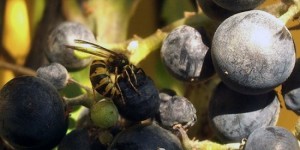The discovery that revolutionizes the world of wine: the wasps fundamental for fermentation
Wasps are the alcove of natural yeasts responsible for fermentation of the wine and ensure biodiversity placed at risk from environmental degradation and the use of a few selected strains.

It is the discovery made by researchers at the University of Florence and the Edmund Mach Foundation of San Michele all’Adige, led by Duccio Cavalieri. The research, explained in a statement of the University, has documented for the first time the sexual behavior of yeasts in natural environments, rebuilding stages and places of the coupling of different strains. The scientific journal PNAS has shown the work among the most interesting ones and Science has already commented on the news and views.
“We had already discovered in 2012 – says Cavalieri, associate general microbiology at the Athenaeum of Florence – that the wasps bring the intestines the yeast Saccharomyces cerevisiae, and left them on the mature grapes, where they can start the fermentations naturally”. To understand what happened then to yeast in the gut of the wasps, insects were inoculated into 5 different strains of S. cerevisiae and compared, after two months of winter hibernation of wasps, the behavior of these yeasts with the same number of colonies grown in the laboratory.
“After hibernation, the intestines of wasps contains more hybrids parental strains that parents – explains Knights -. We demonstrated that the gut is the primary environment in which the yeast S.cerevisiae are coupled with each other and with other strains of wild Saccharomyces, present in nature, thus allowing the evolution of strains particularly suited to withstand the stresses of the fermentation of wine and beer. It ‘s the long stay in this confined environment to facilitate the generation of gametes and the intersection between gametes of individuals (strains) of the same species and of different species”.
“The wasps are put at risk from environmental degradation – said Stefano Turillazzi, professor of zoology and team member -. But the biodiversity of these and other social insects, such as bumblebees, has an importance that goes beyond their role as pollinators and calls for maintaining assets typical microbial important for the quality and uniqueness of our products”.
Source: cronachedigusto.it





Leave a comment